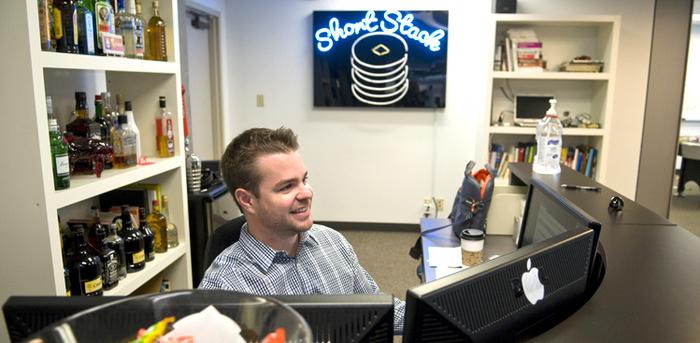
The open office concept has been around for awhile, but lately has come under fire. Apparently the setup—no walls, no doors, shared workspaces—undermines what the concept was designed to achieve: communication and flow of ideas among employees. According to some research, the open concept decreases employees’ job satisfaction and decreases privacy, which also affects productivity.
But despite what some of the organizational psychologists and other productivity experts say, I’m convinced the open concept can make a team more cohesive, especially if it’s adopted by the senior staff and CEO. It can also give company leaders a better view of what’s going on. Those are just two reasons I’m leaving my company’s mostly open concept setup as it is (we have a few employees who are more productive when they work in their own offices). And it’s also the reason that I, the CEO, sit at the desk that’s usually reserved for the receptionist, right next to the front door. Yep, just like Pam, from The Office.
Here are four reasons leaders should consider sitting in the middle of the action—instead of tucked away in a private corner office.
1. You Can Easily Take the Pulse of the Office
I’m within earshot of pretty much every conversation that goes on. It’s not like I relish being some sort of NSA operative, but since I can hear most of what my team is discussing, I have an opportunity to weigh in and offer guidance when it’s needed.
For example, ShortStack prides itself on providing exceptional customer service, yet there are inevitably customers who are unhappy. When I overhear our customer service agents chatting about a disgruntled user and how to best handle his or her issues, I can jump in and take over the support ticket or recommend the agents offer a refund or some other account adjustment. I’ve learned that our agents appreciate knowing I’m tuned in, and we also get plenty of feedback from our customers letting us know they appreciate how responsive we are. If the agents had to schedule time to talk with me to resolve users’ issues, I suspect we’d have less complimentary feedback.
2. You’re More Approachable
I’ve never had the pleasure of working in an office full of cubicles or separate offices. That said, I envision a corporate setup as being very compartmentalized and the kind of place where the “staff” don’t feel comfortable talking to the “executives.” Where the junior employees are stuck in the middle and the senior level people are tucked away behind closed doors, kind of like Mad Men.
Setting up my desk near the front door and, coincidentally, next to the kitchen, means people are walking by all the time; anyone can ask me anything at pretty much any time. Messages don’t get filtered through some crazy telephone game. I can wave my hand and get done what needs to get done. Sitting in the open also means I’m part of the daily chatter that goes on. This gives me a glimpse of what’s going on in employees’ lives, which has made me a more empathetic leader. I suspect the fact that I’m so approachable contributes to ShortStack’s unusually friendly atmosphere.
3. It Keeps the Meetings to a Minimum
Working in an open environment also means we don’t have to waste lots of time in staff meetings because we all pretty much know what’s going on. We meet as a team every other week, and those meetings last for 30 minutes, max. When I have an announcement I need everyone to hear, I stand up and say, “Listen up.” I suspect if we were all closed off we’d meet more often and for much longer. Since meetings are wasted time (in my opinion, of course) I’m happy with our current setup.
And while I love tools like HipChat and Slack, it’s also nice to hear people actually talking to one another.
4. You Find a “Better” Role for Yourself
When ShortStack first opened its doors in 2010, we were a “staff” of three, and I did a little bit of everything. Now that we’ve grown a bit—there are 17 of us—I’ve been able to delegate some of the things that aren’t necessarily my strengths. Like social media. And accounting. And IT. And, well, you get the idea.
Sitting in the midst of my team allows me to gauge their strengths and weaknesses and pass work along that they’re better suited for. That way I can do more of what I’m better at: analyzing data, architecting new features, and writing code.
In truth, my own productivity is not always great at the office, at least when it comes to doing work that demands total focus, including analyzing data and writing guest posts. When I have deadlines to meet or work that needs my absolute attention, I work at home—something my staff is welcome to do as well. You could also try one of Scott Dockweiler’s tips for staying focused in an open office.
But most of the time, working in the middle of it all seriously benefits my company. I’m able to really understand what’s going on, I’m able to keep transparency, and I’m able to get to know my staff and be part of the team, rather than somebody who’s leading from above.